[K12配套]九年级英语上册Unit3Englisharoundtheworld词汇精讲精练句式精讲新版仁爱版
九年级英语上册《Unit 3 English Around the World》Topic3 SectionC 教案 仁爱版
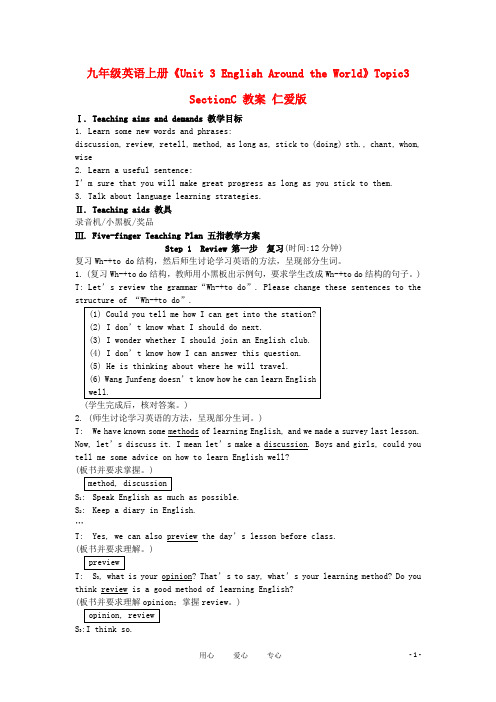
九年级英语上册《Unit 3 English Around the World》Topic3SectionC 教案仁爱版Ⅰ. Teaching aims and demands 教学目标1. Learn some new words and phrases:discussion, review, retell, method, as long as, stick to (doing) sth., chant, whom, wise2. Learn a useful sentence:I’m sure that you will make great progress as long as you stick to them.3. Talk about language learning strategies.Ⅱ. Teaching aids 教具录音机/小黑板/奖品Ⅲ. Five-finger Teaching Plan 五指教学方案Step 1 Review 第一步复习(时间:12分钟)复习Wh-+to do结构,然后师生讨论学习英语的方法,呈现部分生词。
1. (复习Wh-+to do结构,教师用小黑板出示例句,要求学生改成Wh-+to do结构的句子。
) T: Let’s review the grammar“Wh-+to do”. Please change these sentences to the structure of “Wh-+to do”.(学生完成后,核对答案。
)2. (师生讨论学习英语的方法,呈现部分生词。
)T: We have known some methods of learning English, and we made a survey last lesson. Now, let’s discuss it. I mean let’s make a discussion. Boys and girls, could you tell me some advice on how to learn English well?(板书并要求掌握。
九年级英语上册《Unit 3 English around the world Topic 1 En
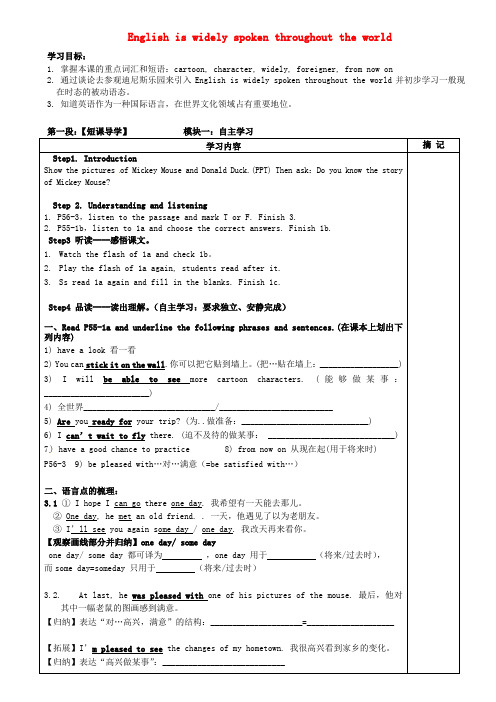
English is widely spoken throughout the world学习目标:1. 掌握本课的重点词汇和短语:cartoon, character, widely, foreigner, from now on2. 通过谈论去参观迪尼斯乐园来引入English is widely spoken throughout the world并初步学习一般现在时态的被动语态。
3. 知道英语作为一种国际语言,在世界文化领域占有重要地位。
第一段:【短课导学】模块一:自主学习学习内容摘记Step1. IntroductionShow the pictures of Mickey Mouse and Donald Duck.(PPT) Then ask:Do you know the storyof Mickey Mouse?Step 2. Understanding and listening1. P56-3,listen to the passage and mark T or F. Finish 3.2. P55-1b,listen to 1a and choose the correct answers. Finish 1b.Step3 听读----感悟课文。
1.Watch the flash of 1a and check 1b。
2.Play the flash of 1a again, students read after it.3.Ss read 1a again and fill in the blanks. Finish 1c.Step4 品读----读出理解。
(自主学习:要求独立、安静完成)一、Read P55-1a and underline the following phrases and sentences.(在课本上划出下列内容)1) have a look 看一看2) You can stick it on the wall.你可以把它贴到墙上。
九年级英语上册《Unit 3 English around the Word Topic 2 English is B》讲学稿
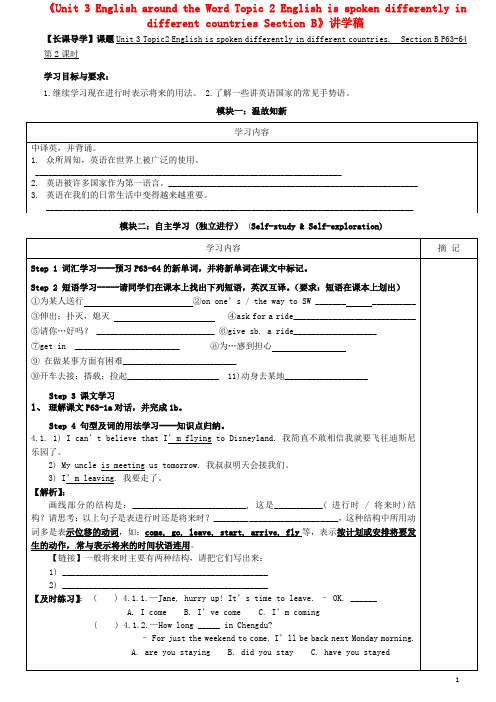
《Unit 3 English around the Word Topic 2 English is spoken differently indifferent countries Section B》讲学稿【长课导学】课题Unit 3 Topic2 English is spoken differently in different countries. Section B P63-64 第2课时学习目标与要求:1.继续学习现在进行时表示将来的用法。
2.了解一些讲英语国家的常见手势语。
模块一:温故知新模块二:自主学习 (独立进行) (Self-study & Self-exploration)____________________________生的动作,模块三:交流研讨 (小组交流、合作、展示)(Cooperation ,Exploration &Show):课本,仿照例句编写对模块四:教师精讲(认真听讲并记录要点)教学反思:模块五:当堂训练(预时20分钟)姓名:__________班级:九(____)一、单项选择。
( ) 1.If you want to ______, you should put out your hands with your thumb raised.A. ask for helpB. ask for a rideC. call someoneD. turn left( ) 2. We _____ to the U.S.A. tomorrow.A. will travelingB. are travelingC. travelingD. travel( ) 3. Wang Junfeng is leaving for Disneyland, so we are to _______.A. see him offB. see off himC. pick him upD. meet him( ) 4.My father has gone to Japan. He will be back ______ two weeks.A. inB. afterC. beforeD. later( ) 5. We have no trouble _______ people from different countries because we know English well.A. u nderstandB. understoodC. understandingD. understands( ) 6. I ’m not in good health, so my parents are always _______ me.A. strict withB. worry aboutC. pleased withD. worried about( ) 7. _______ you need help, please call me at once.A. WhateverB. WhicheverC. WheneverD. However( ) 8.-- ______ will he be back? – In a week.A. How longB. Ho w oftenC. How farD. How soon( ) 9.He ______ London and will stay there for a month.A. has leftB. has left forC. has come fromD. comes from( ) 10. My friend Li Jie _______ for Shandong and I’m going to ______ her ______ then.A. leaves; see, ofB. is leaving; see, offC. will leaving; look, offD. isleaving; see, of( ) 11. He took a few deep breaths to ______ himself _______.A. calm; upB. calming; downC. come; downD. calm; down( ) 12. --I hear Zhang Jie is coming to Shanghai, is that so?–Yeah, he’ll _____ Hongqiao Airport in two hours.A. getB. reachC. arriveD. see( ) 13. Please _____ your hands, and let’s do exercises.A. put outB. put onC. put upD. put away二、用所给的单词的适当形式填空。
九年级英语上册《Unit 3 English around the world Topic 1 En
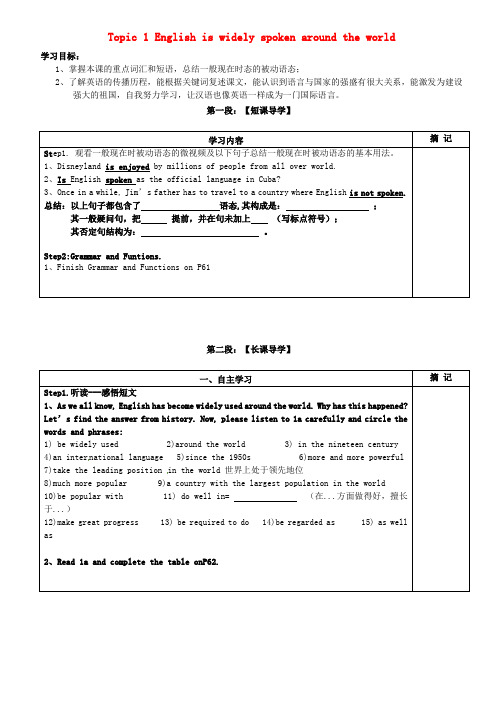
Topic 1 English is widely spoken around the world学习目标:1、掌握本课的重点词汇和短语,总结一般现在时态的被动语态;2、了解英语的传播历程,能根据关键词复述课文,能认识到语言与国家的强盛有很大关系,能激发为建设强大的祖国,自我努力学习,让汉语也像英语一样成为一门国际语言。
第一段:【短课导学】学习内容摘记St ep1. 观看一般现在时被动语态的微视频及以下句子总结一般现在时被动语态的基本用法。
1、Disneyland is enjoyed by millions of people from all over world.2、Is English spoken as the official language in Cuba?3、Once in a while, Jim’s father has to travel to a country where English is not spoken.总结:以上句子都包含了语态,其构成是:;其一般疑问句,把提前,并在句未加上(写标点符号);其否定句结构为:。
Step2:Grammar and Funtions.1、Finish Grammar and Functions on P61第二段:【长课导学】一、自主学习摘记Step1.听读---感悟短文1、As we all know, English has become widely used around the world. Why has this happened?Let’s find the answer from history. Now, please listen to 1a carefully and circle thewords and phrases:1) be widely used 2)around the world 3) in the nineteen century4)an inter national language 5)since the 1950s 6)more and more powerful7)take the leading position in the world 世界上处于领先地位8)much more popular 9)a country with the largest population in the world10)be popular with 11) do well in= (在...方面做得好,擅长于...)12)make great progress 13) be required to do 14)be regarded as 15) as wellas2、Read 1a and complete the table onP62.二、交流研讨摘记Step2.品读---读出理解(组长组织,全组同学合作,完成以下题)一、语言点梳理请看:Now,students are required to learn En glish, and the study of English is regardedas a very important industry in China as well as in the rest of the world.现在,学生被要求学英语,而且无论在中国还是在世界上其他国家,英语学习都被认为是一个非常重要的产业。
仁爱英语九上Unit3课文翻译
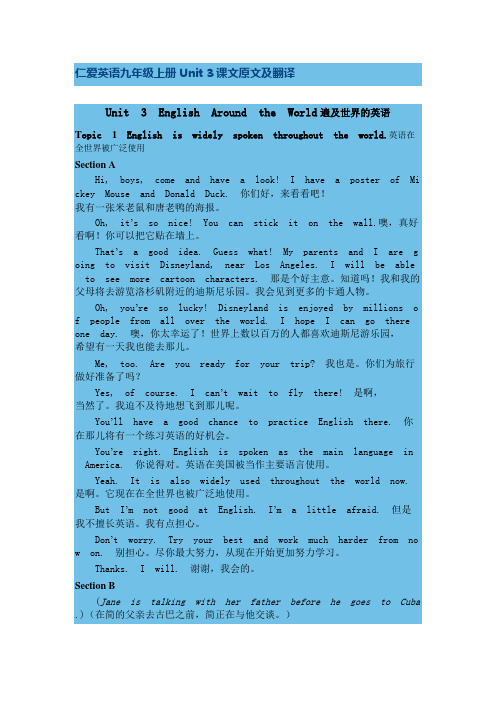
仁爱英语九年级上册Unit 3课文原文及翻译Unit 3 English Around the World遍及世界的英语T opic 1English is widely spoken throughout the world.英语在全世界被广泛使用Section AHi, boys, come and have a look! I have a poster of Mi ckey Mouse and Donald Duck. 你们好,来看看吧!我有一张米老鼠和唐老鸭的海报。
Oh, it’s so nice! You can stick it on the wall.噢,真好看啊!你可以把它贴在墙上。
That’s a good idea. Guess what! My parents and I are g oing to visit Disneyland, near Los Angeles. I will be able to see more cartoon characters. 那是个好主意。
知道吗!我和我的父母将去游览洛杉矶附近的迪斯尼乐园。
我会见到更多的卡通人物。
Oh, you’re so lucky! Disneyland is enjoyed by millions o f people from all over the world. I hope I can go there one day. 噢,你太幸运了!世界上数以百万的人都喜欢迪斯尼游乐园,希望有一天我也能去那儿。
Me, too. Are you ready for your trip? 我也是。
你们为旅行做好准备了吗?Yes, of course. I can’t wait to fly there! 是啊,当然了。
我迫不及待地想飞到那儿呢。
You’ll have a good chance to practice English there. 你在那儿将有一个练习英语的好机会。
【最新】仁爱版九年级英语上册Unit 3 English Around the World Topic 1 Section D 教案
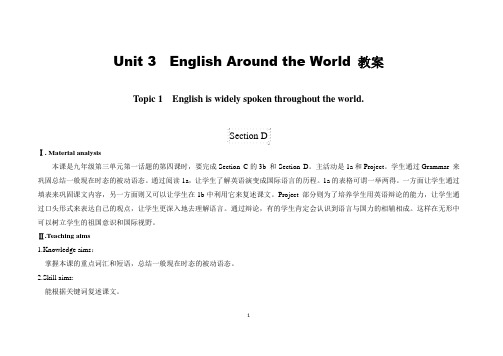
1Unit 3 English Around the World 教案Topic 1 English is widely spoken throughout the world.Section DⅠ. Material analysis本课是九年级第三单元第一话题的第四课时,要完成Section C 的3b 和Section D 。
主活动是1a 和Project 。
学生通过Grammar 来巩固总结一般现在时态的被动语态。
通过阅读1a ,让学生了解英语演变成国际语言的历程。
1a 的表格可谓一举两得。
一方面让学生通过填表来巩固课文内容,另一方面则又可以让学生在1b 中利用它来复述课文。
Project 部分则为了培养学生用英语辩论的能力,让学生通过口头形式来表达自己的观点,让学生更深入地去理解语言。
通过辩论,有的学生肯定会认识到语言与国力的相辅相成。
这样在无形中可以树立学生的祖国意识和国际视野。
Ⅱ.Teaching aims 1.Knowledge aims :掌握本课的重点词汇和短语,总结一般现在时态的被动语态。
2.Skill aims:能根据关键词复述课文。
能运用一般现在时态的被动语态,以口头和书面的形式来表达自己的观点,进行英语辩论。
3.Emotional aims: (optional)通过了解英语的传播历程,认识到语言与国家的强盛有很大关系,从而激发学生努力学习,建设强大的祖国,让汉语也像英语一样成为一门国际语言。
4.Culture awareness: (optional)英语是汲取西方文化和传播东方文化的桥梁,英语的优势地位在未来相当长的时间内不会减弱。
Ⅲ. The key points and difficult points1. Key points:Words and phrases: Britain, powerful, leading, position, take the leading position, as a result, encourage sb.to do sth., be popular with sb., make great progress in doing sth., be required to do sth., be regarded as.Sentences: The American computer and Internet industry have taken the leading position in the world.Many of them have done well in English and have made great progress in speaking it.Grammar: the simple present passive voice.2. Difficult points:理解英国的不同称呼:UK, the United Kingdom, Great Britain。
九上Unit3 English Around the World教案
仁爱版九上Unit3教案T opic 1 English is widely spoken throughout the world.Section AⅠ. Teaching aims and demands 教学目标1. Learn a new word and some phrases:language, from now on, be pleased with2. Learn some useful sentences:(1)I can’t wait to fly there!(2)You’ll have a good chance to practice English there.(3)Try your best and work much harder from now on.3. Help the students learn the usage of passive voice:(1)Disneyland is enjoyed by millions of people from all over the world.(2)English is spoken as the main language in America.(3)It is also widely used throughout the world now.Ⅱ. Teaching aids 教具单词卡片/卡通图片/小黑板/录音机Ⅲ. Five-finger Teaching Plan 五指教学方案Step 1 Review 第一步复习(时间:8分钟)复习节能环保知识,然后创设语境,呈现部分生词,引出被动语态,导入新课。
1. (复习节能环保知识,加强学生爱护环境的意识。
)T: We know the earth is our home. Everyone is supposed to keep our home beautiful and save energy. Please list good habits of making your hometown more beautiful.S1: We should reduce the waste we produce.S2: We should use both sides of paper and reuse plastic bags.S3: We ought to turn off the lights when we leave a room.S4: We should grow fruit and vegetables ourselves.S5: We’d better walk or ride a bike instead of taking a bus or a taxi if we’re traveling a short distance.…(教师作小结,为下一步作准备。
九年级英语上册《Unit 3 English around the world Topic 1 En
Topic 1 English is widely spoken around the world学习目标:复习Unit 3-Topic1单元的单词、短语和语句。
第一段:【短课导学】模块一:自主学习学习内容摘记一、重点单词。
1.漫画_________________2.普通地;广泛地_________________3.在今晚_________________4.沟通,交流_________________5.对话;谈话_________________6.解释,说明_________________7.不可能存在的,不可能的_________________ 8划分_________________9.掘(地);挖(土)_________________ 10.放置,安放_________________11发言者 ________________ 12.外国的_________________13.欧洲的_________________ 14.旅游者;游客________________15.英国,不列颠_________________ 16.强大的;有影响力的_________________二、重点短语。
1.从现在起_______________2.对……感到高兴_________________3.出差_______________________4.与……相似_______________________5.把……分成___________________6.母语___________________7.占有主要的位置_________________ 8.被认为……___________________三、重点语句。
1. Disneyland is enjoyed by millions of people from all over the world.(全世界)2. I can’t wait _____________(fly) there!3. Try your best and work much harder ______________.(从现在起)4. Walt Disney was a great film-maker ______________(和……一样)an artist.5. Many kids have trouble______________(与……相处)their parents nowadays.6. Of all these languages, English is the most widely used.(被广泛使用)四、语法――一般现在时的被动语态。
初三英语《Unit 3 English Around the World Topic 3》教案
Unit 3 Topic3SectionB
Words and phrases:Grammar:
a+loud =43; to do
1).What’s her/his difficulty in learning English?
2).Can you give her/his some advice on how to learn English well?
Then to 1a
Step 2 Presentation
1.Listen to the 1a and complete the table.
diary....But I dare not speak English in public.
make oneself understood
dare not do sth.
be afraid of
feel like doing
教学后记:
TheSecond Period
Section B
教学三维目标
Unit 3 English Around theWorld
Topic 3 Could you give us some advice on how to learn English well?
主备人:审核:初三英语备课组复备人:__________时间:_________
课时安排
4课时
The First Period
3.Grammar: how/what + to do
Ⅱ.过程与方法
(1)Talk about thedifficulties in learning English and the advice on how to learn English well tohelp the students make progress in learning English
九年级英语上册《Unit 3 English Around the World》Topic2 SectionD 教案 仁爱版
Ss:Sure./Certainly./No problem.
T:OK. Wang Junfeng is in California now. He has some difficulties in understanding the people there. Because theiraccentsare not all the same.
(教师及时给予鼓励,让学生勇于开口讲英语。)
T: Well done, thank you. You’ve learnt very well.
Step4practice第四步练习(时间:10分钟)
复习本话题的重点语法及有用表达,鼓励学生采用合作学习的方法,学会归纳和总结。
1. (复习现在进行时表示将来时的用法。教师出示一些位移动词,让学生做出更多的例句。)
G1:What color is the white cap that is thrown into the Black Sea?
G2:White. Which table doesn’t have legs?
G3:Timetable. Who earns a living by driving his customers away?
T:What’s the meaning of the word“cookbook”?
S1:It’s a book for cooking. It’s from German. The English language has taken in many new words from other languages. For example, it borrowed“tofu”and“kowtow”from Chinese.
- 1、下载文档前请自行甄别文档内容的完整性,平台不提供额外的编辑、内容补充、找答案等附加服务。
- 2、"仅部分预览"的文档,不可在线预览部分如存在完整性等问题,可反馈申请退款(可完整预览的文档不适用该条件!)。
- 3、如文档侵犯您的权益,请联系客服反馈,我们会尽快为您处理(人工客服工作时间:9:00-18:30)。
Unit 3 English around the world词汇精讲精练句式精讲1. Are you ready for your trip?be / get ready for sth.表示“为……做准备”。
get sth. ready意为“把某物准备好”。
例如: The students are getting ready for the test. 学生们在为考试做准备。
Please get your school things ready. 请把学习用具准备好。
I will get the lunch ready. 我会把午餐准备好。
【拓展】(1)be/get ready to do sth. 表示“准备做某事”。
例如:Are you ready to go fishing? 你准备好去钓鱼了吗?(2)be always ready to do表示“乐于做某事”。
例如:She is always ready to help others. 她总是乐于助人。
2. I’m going on Cuba on business tonight.be going此处为“现在进行时表将来”。
现在进行时表将来主要用于表示按计划或安排将要发生的动作,常有“意图”“安排”或“打算”的含义。
这种现在进行时比较生动,给人一种期待感。
go, come, leave等表示位移的动词,都可以用于现在进行时表将来。
例如:He is going. 他要走了。
I’m coming. 我要来了。
Tom is leaving. 汤姆要走了。
3. I don’t think I will have any long conversations in Spanish.… think后所加的从句是宾语从句,意为“……认为……”。
例如:I think he is a good boy. 我认为他是一个好孩子。
【拓展】(1)当think后接的宾语从句为含有not的否定句时,该否定应移至主句,即否定主句的谓语动词。
例如:I don’t think it will rain tomorrow. 我认为明天不会下雨。
I don’t think you are right. 我认为你不对。
(2)…thi nk后经常用it作形式宾语,即“… think it(形式宾语) + adj. + for sb. + 动词不定式”意为“某人认为……如何”。
例如:Do you think it useful for us to read more books? 你认为我们多读书有用吗?4. There are even more people, like some in Europe as well as in China and Japan, who studyEnglish as a foreign language.as well as常用来连接两个并列的成分,作“也,还”解。
它强调的是前一项,后一项只是顺便提及。
因此连接并列主语时,谓语动词与前一项一致;翻译时要先译后面,再译前面。
例如: Your family as well as you is friendly to me.不仅你而且你的家人也对我很友好。
【拓展】(1)as well as 用来表示同级比较,指“和……一样好”。
例如:You can do as well as your father if you work hard.如果你努力的话,你会和你爸爸做的一样好。
(2)as well常用作状语, 作“又;也”解, 相当于too或also, 常位于句末, 无须用逗号与句子分开。
例如:She gave me a piece of paper, and a pen as well.她给了我一张纸还有一支钢笔。
5. It’s very difficult for me to remember new words.It is / was + adj. + to do sth. 意为“做某事是……的”,to do sth.为句子的真正的主语,在这个结构中,it是形式主语,真正的主语是后面的不定式。
例如:To learn English is not easy. = It’s not easy to learn English. 学英语不容易。
【拓展】(1)It’s + adj. + for sb. to do sth.这一结构中,形容词是表示做某事的“性质、特征”,这类形容词有:important,easy,difficult,hard,necessary等。
(2)It’s + adj. + of sb. to do sth.这一结构中,形容词是表示人的“品质”,这类形容词有:kind,wise,clever,good,foolish等。
例如:It’s kind of you to say so. 你这样说真是太善良了。
It’s necessary for you to do more exercise. 多锻炼对你来说是必要的。
6. …but it seemed that I haven’t made any progress.It seems that…句型实质上是“主+系+表”结构。
其中it是人称代词,并无实意,指的是某种情况,seems为连系动词,that / as if 引导表语从句。
It seems that …表示“看起来……”。
强调根据一定的事实所得出的一种接近于实际情况的判断,可以表示事实。
(可以转换成“名词或代词+ seem +动词不定式”句型,其意不变,如果动词不定式为“to be +形容词”时,to be往往省略。
)It seems that it is more difficult for women to get to the top of the company.妇女似乎更难提升到公司的最高职位。
It seems that no one knows what has happened in the park.=No one seems to know what has happened in the park.似乎没有人知道在公园里发生了什么事。
It seems to me that he has known everything.=He seems to have known everything.在我看来他似乎什么事都知道了。
It seems to me that Mr. White will not come again.依我看,怀特先生不会再来了。
It seems that she is happy. 她似乎很高兴。
句式精练I. 补全对话。
A: Hi, everybody. I’m Becky. Welcome back to “The Problem Line”. Today, we’re going to talk about problems with parents. Okay, it’s time for another call. 1B: Hello. My name’s David.A: Hi, David. Welcome to “The Problem Line”. 2B: Well, I’m having problems with my mom. Every time we talk about some thing, we argue.A: 3 It’s impolite.B: I know. But she always arranges (安排) everything for me. I can’t even decide what to wear on weekends.A: That’s too bad. 4B: I tried, but she never listened to me. She thinks I should listen to her be cause I’m herchild.A: Well, that’s a difficult problem. 5C: Hello, I’m Vera. I think David should ask his teacher for help. Perhaps his mother will listen to his teacher.II. 句型转换,每空一词。
1. The teacher gives us much homework every day. (改为被动语态)Much homework ________ ________ _________ us every day.________ _________ __________ much homework every day.2. He usually sees his grandfather on Sundays. (改为被动语态)His grandfather ______ usually _______ ________ ________ on Sundays.3. Does Michael do a lot of reading every day? (改为被动语态)______ a lot of reading _______ by Michael every day?4. Who writes the letters to Jenny? (改为被动语态)By ___________ the letters ______ to Jenny?5. Is the noise made by Jim? (变为主动语态)_______ Jim _________ the noise?6. The machine is used for keeping the room wet by us. (变为主动语态)_________ the machine for keeping the room wet.7. He is often seen to play football by our teacher. (改为主动语态)Our teacher often _________________ football.8. He is giving a lot of presents by his uncle sometimes. (改为主动语态)His uncle _________ a lot of presents ___ him sometimes.9. This kind of mobile phone is made in China. (对画线部分提问)________ this kind of mobile phone ________?10. One of the classrooms is often cleaned by them. (改为一般疑问句)________ one of the classroom often _________ by them?III. 根据汉语意思完成句子,每空一词。
